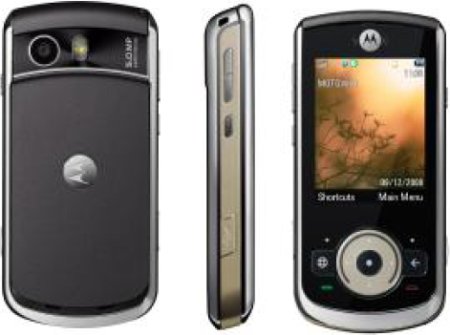Mot camera-phone runs widgets
Nov 18, 2008 — by Eric Brown — from the LinuxDevices Archive — 4 views Motorola announced a Moto VE66 camera-phone that offers WiFi, GPS, a 5-megapixel camera, an MP3 player, and MontaVista Linux. The VE66 is the first Motorola phone to support the MotoDev Studio for WebUI “widget” platform, says Motorola, which also announced a “MotoDev Widget Developer Challenge.”
Motorola announced a Moto VE66 camera-phone that offers WiFi, GPS, a 5-megapixel camera, an MP3 player, and MontaVista Linux. The VE66 is the first Motorola phone to support the MotoDev Studio for WebUI “widget” platform, says Motorola, which also announced a “MotoDev Widget Developer Challenge.”
href=”/ldfiles/misc/mot_ve66_new.jpg”>(Click for larger view of the VE66)
Despite recently announcing that it will no longer develop phones based on either Symbian UIQ or its MotoMAGX Linux/Java development platform, in order to focus on Google Android and Windows Mobile, Motorola continues to release MotoMagx-based phones still in the pipeline. Last week, reports surfaced of an EM35 music phone (below, right) based on MontaVista Linux and the MotoMAGX stack.
 Motorola EM35 (Click for details) |
Motorola remains mum on the EM35, but today it formally announced the more upscale VE66 slider-phone, which is based on MotoMAGX 7.4 and will be targeted at Asia and EMEA. The VE66 is equipped with 256MB ROM, 128MB user-accessible RAM, plus 32GB of microSD internal flash and 110MB of user flash, says Motorola. The 2.2-inch display is said to provide 240 x 320 resolution and 262K colors.
 Motorola ZN5 (Click for details) |
Although somewhat similar in appearance to the slider-format EM35, the VE66 appears more functionally similar to the candy-bar style MotoZine ZN5, (pictured at left), which was announced in June. Like the ZN5, it offers 802.11b/g WiFi, Bluetooth, a micro-USB 2.0 port, and a 5-megapixel camera. The VE66 also provides an assisted GPS (AGPS) transceiver.
The GSM quad-band EDGE/GPRS phone is equipped with Motorola's “CrystalTalk” technology, which is said to improve voice quality even in noisy environments. The MP3 player on the VE66 is supported by a scroll navigation wheel, but the phone appears to lack the ZN5's haptic interface and “ModeShift” technology. The VE66 is larger than the ZN5, measuring 4.1 x 1.9 x 0.6 inches (103 x 49.5 x 15.2mm).

Motorola VE66
The phone's 5-megapixel camera is touted for its auto focus, 8x zoom, LED flash, image stabilization, and red eye removal. The VE66 is also said to provide 30fps video capture and playback, as well as offer support for Windows Media Player 11 and Janus DRM for media files. Additional features include an FM radio that supports the RDS (Radio Data System) standard, popular in Europe, which can download information such as track and artist.
A new WebUI platform and a Widget Developer Challenge
Motorola also released a beta of its MotoDev Studio for WebUI, an Eclipse-based platform for widget development on the VE66 and future widget-compliant Motorola Linux/Java phones. To inspire developers to work with the WebUI platform, Motorola has also announced a MotoDev Widget Developer Challenge.
MotoDev Studio for WebUI is one of four Eclipse-based MotoDev Studio platforms, which include versions for Linux, Java ME, and UIQ. Considering the company's plans to ditch UIQ and focus its future Linux efforts on Android, these platforms may well be re-jiggered or abandoned in the coming months. However, because widgets operate independently of the operating system, they should work on future Motorola phones based on Android or Windows Mobile.
Written using common web standards such as xhtml and css, and rendered via an integrated WebKit engine, the WebUI widgets can place frequently updated information directly onto the phone's background, says Motorola. Seen as a way to enable mobile operators to deliver new services to phones in the field without the risk of a firmware upgrade, widgets might include real-time sports scores, stock tickers, flight information, as well as social media communications and news headlines, says the company.
Widget Developer Challenge entries will be accepted until Feb. 27, 2009 for best widget in category, best local content, and best use of APIs, and there will also be a grand prize of $25,000 for best overall widget. Judges will evaluate entries based on “uniqueness, effective use of the platform, harmony of design, indispensability, and applicability,” says Motorola. Category winners will be announced in the Spring of 2009, and prizes are said to total $200,000, plus free Mot handsets and accessories, and recognition at CTIA Wireless 2009.
Availability
The Moto VE66 is expected to be available in Q4 2008, says Motorola, at an undisclosed price. More information may be found here. More information on the MotoDev Widget Developer Challenge may be found here.
This article was originally published on LinuxDevices.com and has been donated to the open source community by QuinStreet Inc. Please visit LinuxToday.com for up-to-date news and articles about Linux and open source.